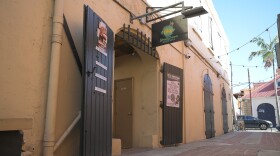ST. CROIX — After receiving an urgent request for an infusion of dollars from physicians at both of the territory’s hospitals to purchase basic supplies, pay vendors, and hire more staff, Senator Ray Fonseca said he will meet privately with some of his colleagues on Thursday to discuss available funding sources.
“We are meeting tomorrow in an emergency meeting to discuss this,” Fonseca, who chairs the Committee on Health, Hospitals and Human Services, said on Wednesday. “But I do think that the VI government can identify the resources.”
Fonseca suggested an allotment of $10 million to each hospital.
“I think we can identify $20 million to give to the hospitals,” he said.

Fonseca said the goal is for the senators to identify a funding source and draft an appropriation bill that would be considered during the lawmaking body’s next legislative session later this month.
The meeting to identify funding to support the hospitals came about after Fonseca received a letter from 28 physicians who work at the Governor Juan F. Luis Hospital and Medical Center on St. Croix requesting an immediate injection of $17.6 million for supplies, new hires, and vendor debt.
The St. Croix physicians highlighted in their letter that JFLH has faced severe financial distress over the past year and a half due to declining government funding, delayed and inadequate allotment payments, decreased Medicaid reimbursement, and the disenrollment of Medicaid patients, leading to increased uncompensated patient care. The physicians suggested the government allotment for uncompensated care should be increased to $1.4 million per month, noting the hospital cannot sustain fiscal solvency without it. The hospital’s inability to pay vendors and staffing agencies who provide supplies and clinical staff has resulted in vendor credit holds, freezing essential accounts until past debts are settled, according to the letter. The physicians indicated the result is a chronic physician and nursing shortage, an absence of critical supplies, and deferred maintenance of vital equipment. They requested immediate relief to prevent further deterioration of patient care and ensure patient safety.
In the March 24 letter, the St. Croix physicians noted that the only staff anesthesiologist would be off island this week so no surgeries would be performed, requiring patients who need surgery to be transferred by air ambulance to Puerto Rico or the U.S. mainland, leading to significant, life-threatening delays in treatment. During this month, the physicians wrote that three 12-hour shifts in the Emergency Department have no physician scheduled, noting shortages continue into May. They wrote that two staff physicians in the Emergency Department recently resigned due to the lack of essential resources, noting that nearly half of the department’s shifts will lack physician coverage once the physicians leave the hospital.
The St. Croix physicians, who wrote in their letter that JFLH has lacked basic, essential tests in addition to supplies and equipment every day so far this year, noted the hospital has a staff of 33 physicians but needs 63, representing a shortage of 30 physicians in selected specialties. While traveling physicians have helped provide care, the St. Croix physicians noted many staffing agencies now refuse to staff JFLH due to the hospital’s inability to pay.
The St. Croix physicians suggested the solution is to hire 30 physicians to fully staff the hospital in addition to immediately paying outstanding bills to physicians and staffing agencies so coverage could be provided while hiring permanent staff. They requested $600,000 to recruit and relocate permanent staff and $7 million to pay either traveling or permanent physicians over the next year. They also requested $10 million to immediately pay down outstanding debt totaling $22 million, noting JFLH lacks medications, reagents, supplies, and equipment because it is on credit hold for most of its vendors. They noted an inability to pay the pharmaceutical vendor has resulted in limited supplies of medications, including cardiac medications for patients with severely high or low blood pressure, and antibiotics to treat infections. They wrote that the hospital only has enough of the medication used to treat heart attacks and strokes for one or two patients, and the pharmacy dispensed the last tetanus vaccine, which is standard of care for any significant open injury. They noted critical equipment remains unrepaired due to outstanding vendor payments.
Fonseca also received a letter from 79 physicians who work at Schneider Regional Medical Center on St. Thomas requesting funds to pay vendors, purchase supplies and equipment, hire appropriate staff in critical shortage areas, and repair or replace outdated equipment to safely treat patients.

“St. Thomas is just as bad,” Fonseca said. “They have bigger bills because they are a full-sized hospital. We’re in an emergency.”
The St. Thomas physicians, in their letter dated March 31, which was signed by Dr. Gilbert Comissiong, SRMC medical staff president, noted that patient care has become more difficult to administer, and patient safety has become more of an issue with funding as the main culprit. They noted inefficiencies in the Emergency Department, Maternal Child Health, Anesthesia Department, Internal Medicine Department, and Surgery Department.
The St. Thomas physicians wrote that the lack of lab support, supplies, and staffing makes the Emergency Department inefficient at caring for patients, noting physicians are unable to get basic, critical lab results to treat patients. They wrote that supplies are at an all-time low, noting there are no urinals, bedpans, diapers, flushes, or intravenous tubing.
The Maternal Child Health unit at SRMC, which cares for expecting mothers and newborns, is short staffed on midwives and does not have basic supplies in stock like drapes, packs, diapers, wipes, and preferential sutures, according to the letter. The physicians noted the shortage of supplies and services has led the hospital to refer away any moderate or higher-risk surgeries that would have routinely been performed.
The St. Thomas physicians wrote that the Anesthesia Department is critically understaffed and has a supply shortage. They noted equipment and supply problems in the lab as well as staffing issues in the blood bank present major patient safety issues in the Internal Medicine Department. They wrote that the Surgery Department is missing day-to-day basics like sutures, drapes, plates, screws, implants, and lenses.
The St. Thomas senator also renewed his request for Governor Albert Bryan Jr. to declare a hospital state of emergency to provide more flexibility in accessing funding sources. Fonseca previously wrote the governor a letter dated January 31 calling on him to immediately declare a hospital state of emergency.
READ MORE: “Fonseca skeptical of request for hospital state of emergency; Bryan committed to addressing issues”
“Once you declare a state of emergency, certain rules are eased and bent and relaxed and no longer applicable,” Fonseca said. “There’s other things that he can do. He can even go to the bank and get a temporary emergency loan, use other collateral. There’s a lot of things the governor could do, but he has to declare a state of emergency.”
Richard Motta Jr., Government House communications director, told WTJX in February that the governor is not aware of any additional resources that would become available if he declared a state of emergency.
“The financial issues confronting the territory’s hospitals are serious, and I’m not sure that calling a state of emergency will unlock any resources that will be able to substantively address those,” Motta said.
*The headline has been adjusted to clarify that physicians from JFLH and SRMC sent separate letters to Fonseca.















